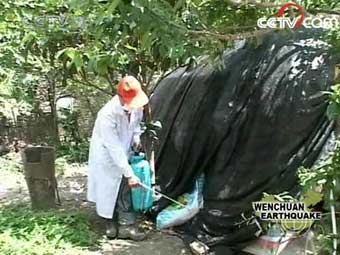In Sichuan, all the quake-affected areas have been covered by the epidemic prevention system. Epidemic medics have reached over 96 percent of the worst-hit villages.

More than 10,000 epidemic prevention and monitoring staff are currently working in Sichuan Province.
More than 10,000 epidemic prevention and monitoring staff are currently working in Sichuan Province. Over 96 percent of the worst-hit villages have at least two or three medics in charge of epidemic monitoring and disinfecting.
Meanwhile, training on reporting emergencies has been completed in 13 of the worst-hit areas. In this way, new epidemic cases can be immediately called in to the China Disease Prevention and Control Center.
The Ministry of Public Health is also focusing on establishing a long-term mechanism in the quake zone. It has ordered a unified system of directives on epidemic prevention and monitoring the origins of any diseases. Any infectious cases will be quarantined and treated on the spot.
In remote mountain villages, drinking water resources are being monitored to ensure a safe supply. The use of disinfectant and insect powders are also being strictly controlled to avoid overuse.
(CCTV June 6, 2008)